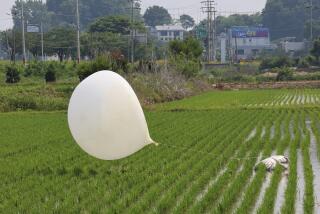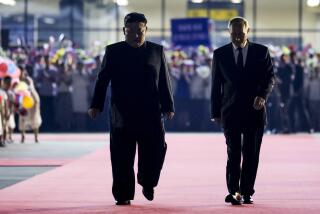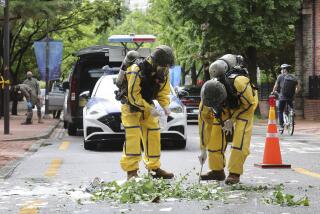In South Korea, defectors see death of Kim as offering hope
The sudden death of Kim Jong Il is forcing North Korea’s prosperous southern neighbor to confront a class divide deep in its midst.
People like Son Jeong Hun, a defector from the north struggling to fit in amid modern, bustling Seoul, hope the dictator’s demise signals a light at the end of the tunnel for their backward homeland.
Others such as South Korean-born Kim Chi-guk, who sells imported chocolate at an exclusive department store, are afraid a train is barreling straight for them — maybe bristling with weapons, maybe jammed with millions of unwashed cousins who will cost them a lot of money.
PHOTOS: Kim Jong Il | 1942-2011
The body of Kim Jong Il, who took over from his father and ruled North Korea for 17 years, lay in state Tuesday in Pyongyang, the capital. Kim Jong Un, designated last year to lead the family dynasty in its third generation, made his first public appearance since his father’s death. Flanked by senior leaders of the military, the ruling party and the government, he bowed before the glass encasement over his father’s body.
Although outside analysts question whether the young man is ready to succeed his father, North Korean media attempted to make his elevation seem inevitable. The official news agency quoted many North Koreans swearing loyalty to a man still in his 20s who was hardly known to them just a year ago.
The transition is likely to play out gradually, answering whether Kim Jong Un is strong enough to take control of North Korea and what that will mean. Will he make a point of belligerence to establish that he must be taken seriously? Will he move to reform North Korea and end its isolation?
In Seoul, just an hour’s drive from the demilitarized zone, those are very concrete questions. No one wants a war with North Korea, or to see its people continue to die of hunger. Still, well-established and prosperous South Koreans are unlikely to wish for dramatic change.
Before he fled a decade ago, Son, 47, was among North Korea’s elite. College-educated, he worked to attract foreign investment to North Korea. On the side, he conducted tours for foreign visitors and ran his own import-export business.
News of Kim Jong Il’s death over the weekend created the most confusing day of his life, Son said, inciting a battle of a “thousand different emotions all mixed inside of me.”
Thankful that a tyrant was gone, he nonetheless worried about who would replace him and what it would mean to those still in North Korea. “I see a glimmer of hope that for so many people, there might now be a way out,” Son said.
But the 20,000 northern defectors in South Korea and those who share their concerns — particularly Christians eager to convert the North Koreans — are a distinct minority.
Many others in South Korea instead fret over their personal security and pocketbooks. For years, North Korea has kept an arsenal of weapons aimed at their homes, schools and businesses.
And what ruin will befall South Korea’s bustling economy, they ask, if the Korean peninsula is reunited and millions of impoverished North Koreans come streaming across the demilitarized zone?
As he tended to his chocolate display Tuesday, Kim Chi-guk spoke for many here. “If north and south are reunited,” he said, “my taxes are going to be raised.”
Nearby, clutching her designer bag, Park Jung-hee said the change in North Korea was all over the media, “but it doesn’t affect the people around me.”
In many ways, north and south have become two separate nations since the bloody 1950s conflict that divided them. South Korea has become one of the world’s most wired societies. The world’s 10th-largest economy, it is a major manufacturer of cars and computer technology. Northerners’ average income is less than 1% of their southern neighbors’.
According to an estimate made this year by South Korea’s Unification Ministry, stitching the two countries together would cost between $1 trillion and $2.5 trillion.
“South Koreans want unification. It’s just a question of whether they’re willing to pay the cost, which would wreak havoc on the south’s economy,” said Jasper Kim, a visiting scholar at Harvard University and author of a book examining how the 1997 Asian financial crisis reshaped South Korea’s economic and political thinking.
Kim predicted that South Korea would probably issue vouchers to northerners to use at home in case of reunification in order to keep them there.
Son fears that North Koreans suddenly arriving in the south would be treated much the same as he has been. His status and education in the north mean little here. The only job he could land was as a hotel bellhop.
For defectors, the culture shock of leaving a land of poverty for one of the world’s fastest-paced nations can be overwhelming. Many avoid computers, Son said. In theaters, when the lights go down, some fear someone might kidnap them, a throwback to life under a brutal regime. They buy everything with cash, never imagining the convenience of credit.
And while there are a few government programs to ease their transition, most defectors say they are treated as bumpkins.
Defectors are well aware that their families back in the north face punishment because of their actions. But after years of loneliness and nowhere jobs in Seoul, many question their sacrifice.
“They ask, ‘Is any of this worth my family being punished? Did I make a mistake coming here?’ ” Son said.
Now head of a defector assistance group, the NK Vision Network, he has watched frustrated defectors pack their bags to head north again, knowing what awaits them. “I saw their level of desperation,” he said. “I felt sorry for them.”
Son holds out hope that the culture of haves and have-nots in South Korea will one day change. But a recent survey at his teenage son’s school suggested that the younger generation here cares even less than their parents about the future of their northern cousins, he said.
Over drinks with fellow defectors, he says, the men watch passing South Koreans with their designer fashions and passion for pets, and wonder why they’re not worth the same compassion devoted to a dog or a cat.
At the news of Kim Jong Il’s death, Son said, he searched for signs that everyday South Koreans shared his hope for a unified Korea where northerners pursued the same dreams as southerners.
Once again, he said, he was disappointed. “People just don’t seem to care about North Koreans,” he sighed. “It’s all about their security and their economy. It’s like we don’t even exist.”
PHOTOS: Kim Jong Il | 1942-2011
Jung-yoon Choi of The Times’ Seoul bureau contributed to this report.
More to Read
Sign up for Essential California
The most important California stories and recommendations in your inbox every morning.
You may occasionally receive promotional content from the Los Angeles Times.











